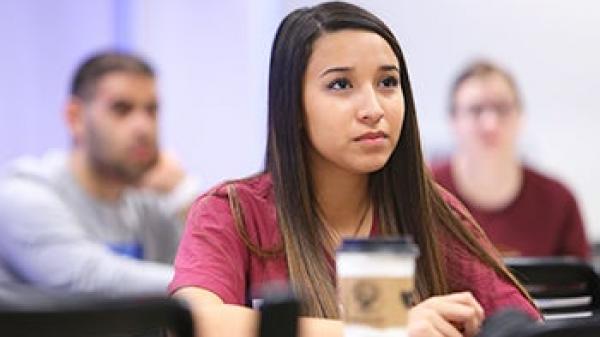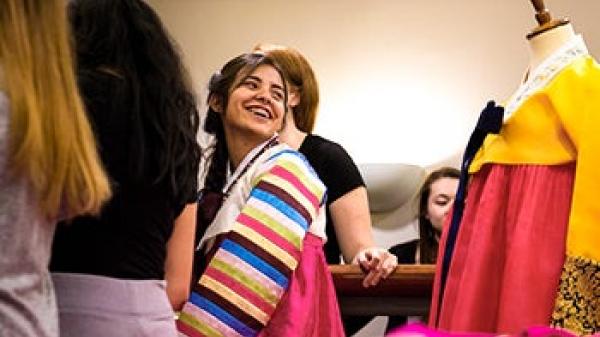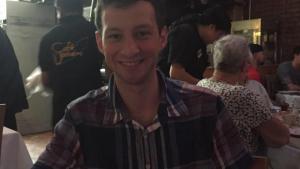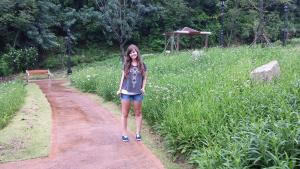Overview
The Korean Program at ASU is the first and only program devoted to Korean language and culture at the university level in the state of Arizona. The program, launched in 1995, has a history of engaging students’ academic curiosity and nurturing students as they become increasingly fluent in the Korean language and culture. Over twenty years later, the program continues to inspire students and is an increasing draw to students here at ASU.
Currently, the program supports five full-time faculty members, whose different interests and specialties create a rich and stimulating Korean program. The program also encourages and supports opportunities to study abroad in Korea. The program continues to expand and has recently launched a Korean minor, following the establishment of the Certificate Program in Korean in 2011, both of which are steps toward the establishment of an undergraduate major and graduate program in Korean Studies at ASU.
The Korean Program offers Korean language courses in all four levels from Elementary (First Year) to Advanced level (Fourth Year) in order to equip them with the practical language skills necessary to function in an increasingly internationalized and competitive marketplace. The Korean Program continues to be committed at all levels to achieving a balance in emphasis among the four language modalities of speaking, reading, writing and listening. Furthermore, in order to respond to the diverse needs of its students, the Korean Program offers an array of specialty courses in:
- premodern and modern literature,
- history,
- religion,
- linguistics,
- film/visual culture,
- popular culture,
- and gender studies.
As with knowledge of other foreign languages and cultures, many career opportunities are open to graduates with proven knowledge of Korean such as:
- Technology
- the public sector
- foreign services
- national security and intelligence
- international diplomacy
- journalism and media
- law
- health care
- finance
- international business education
- translation and interpretation
- travel industries worldwide
- film, new media, and performance management
There are many businesses that are working with Korean companies and employers would like to hire someone who has Korean background. Employers will value cultural insights and communication ability when working with their Korean counterparts. Having a Korean minor at ASU will benefit you to improve your qualifications in the field of global business.
You can obtain the Korean Studies Certificate and/or Minor in Korean along with your current field of study. Majority of our students study:
- another Asian language
- global studies
- international business
- engineering
- sustainability
- communication
- education
- law
Many of our students are interested in teaching English in Korea through the EPIC, TALK programs or in Korean private companies. There are also successful students who go to Korea through the Fulbright Fellowships. Other students have enrolled graduate programs both in the U.S. and Korea.
To discover more about our programs, contact our advisors!
Degrees
Korean (Minor)
Prepare for the 21st-century global marketplace and technological innovation. Today's geopolitics and international security demand more people with knowledge of Korean language and culture. Study Korean, connect with the world and relate more intimately with your K-pop idols and K-drama stars.
Korean Studies (Certificate)
Redefine your personal strengths and stand out in the job market. Learn the skills of critical thinking and cultural diversity in a language employers today are seeking in every field. A certificate in Korean prepares you for the 21st century world of a global marketplace, technological innovation and cultural exchange.
Outreach Programs
Korean Students Association (KSA) The purpose of this club is to provide the understanding on Korean culture, history and society for ASU students as well as provide Korean students with mutual acceptance and friendship.
Korean-American Student Association (KASA) is a student based organization under AAPASC dedicated to the promotion of Korean American Culture. KASA aspires to provide a community for Koreans, Korean Americans, and ANY and ALL people who are interested. KASA aims to help its members learn about Korean culture, explore various Korean activities and practices, and instill cultural pride.
K-Pop Dance Evolution is a dance-based club at Tempe ASU that teaches Korean Pop choreography. A student-run organization, our instructors teach interested students new choreography every week and strive to engage with the local Phoenix/Tempe K-pop community through performance. We perform for events in the Phoenix metro area, including ASU-hosted events and cultural festivals. We accept members from all backgrounds of dance, from beginner to expert level.
The SILC Attaches Club is a club that brings all languages and cultures from SILC together. People are able to learn about different cultures in a fun way when studying a language. Understanding different cultures is such an important attribute to have, and it is one you can obtain through SILC Attaches. This club creates community events, outreach projects, and plans fun get-togethers.
Seoul National University (SNU) (exchange program) Seoul National University has 16 colleges offering courses in areas of study such as humanities, social sciences, natural sciences, business, engineering, fine arts, music, education, and liberal studies. Most courses are taught in Korean, but many courses are taught in English. Students are welcome to enroll in any classes they desire, as long as they meet any applicable course or language prerequisites.
Yonsei University (exchange program) A truly global, buzzing city and the host of the Olympic Games in 1988 and the World Cup in 2002, Seoul is the South Korean capital and also the country's biggest - by far. Seoul is also amongst Asia's most expensive and wealthy cities.The heritage and tourism scene within Seoul is undeniable, with fortresses, temples, shrines, palaces and ceremonies all vying for your attention, along with modern skyscrapers, glitzy shopping malls, and multi-media and entertainment complexes, including the world-famous K-Pop scene, around the Itaewon, Jamsil and Namsan districts.
Korea University International Summer Campus (exchange program) Seoul is a city rich in history and tradition, founded in 1392. It is now the capital city of South Korea, and traces of the former dynasty are still very much a part of the city's landscape. The capital city with an exciting modern architecture and a cosmopolitan community, Seoul is the political, cultural, commercial, financial, educational and recreational center of South Korea. It is home to major corporations, banks, government offices, leading schools and universities, theaters and entertainment facilities. Seoul also offers rich and satisfying tourist attractions and events.
Korea University Business School (exchange program) With a large number of course options that fit directly into the ASU WPC majors and the WPC International Business Certificate, KUBS is a perfect option for business students looking to study in one of Asia's largest and most significant cities. KUBS offers courses in Accounting, Finance, International Business, Logistics, Service & Operations Management (LSOM), Management, Marketing, and MIS. Exchange students also have the option of taking one or two courses in other disciplines offered at Korea University, such as Korean language or culture. For a complete list of courses visit the KUBS course website (remember to change the "Dept." dropdown to "Korea University Business School").
The ability to speak another language opens up more opportunities for scholarships and fellowships. Take a look at our SILC scholarships. ASU also offers an extensive database for you to search through and find the right ones to apply for.
John H. & Sandra B. Koo Scholarship: Established through the generosity of the Koo family, this annual award is given to ASU undergraduate students who excel in Korean language, literature, or culture. The recipients are selected in late February by the Korean faculty at the School of International Letters and Cultures (SILC). The award is presented at the SILC’s annual award ceremony in April. If you have any questions or would like more information about the award or the application process, please contact Sookja Cho ([email protected]) and Bomi Oh ([email protected]).
In the Study Abroad Office, Shira Burns oversees applications to programs. Study Abroad’s deadlines for applying for all programs are September 25th for the spring and February 15th for the fall. ASU financial aid is accepted for all programs on Study Abroad’s approved list.
Here is a list of a few scholarships specific for language:
- Fulbright
- Boren
- Benjamin A Gilman International Scholarship
- USAC Study Abroad Scholarship
- Stohl International Undergraduate Research Scholarships
Fellowships and Internships
- U.S. Department of State has a student internships program through Pathways.
- Thomas Perking Undergraduate and Graduate Foreign Affairs Fellowship
- European Union Internships in Europe.
- European Union Internship in the United States.
- Cultural Ambassador Program
People
Faculty
Alumni Stories
Name Kevin Salter
Graduation year 2016
Major BA in Japanese with a Korean Studies Certificate.
What's your current job?
I work at Authentic Brands Group as the coordinator for the sports brands team. My company is in essence an advertisement agency that happens to hold brands, many of which have retailers in Japan. I communicate with our licensees on a daily basis to ensure that their marketing and brand quality needs are met.
How does language and culture help you succeed in your career?
My company needed someone with language skills to ensure that when a Japanese partner sends us a certificate of insurance they are being transparent about what is insured. I also can check their social media posts against our quality criteria and answer any questions that a Japanese licensee who is not skilled in English may have. Knowing Japanese culture also helps me significantly when explaining decisions that a Japanese licensee has made to my team. More often than not the Japanese style of business differs from how things are done in the USA. Being able to facilitate communications through cultural differences among my peers has been a perk in the workplace.
Did you study abroad? If so, can you speak about your experience?
I studied abroad at Waseda University from 2013 to 2014 (in Japan). It was one of the best years of my life, and I would love to be able to live in Japan again someday. I started out studying as hard as I could, but I actually realized that staying in and studying wasn't helping me as much as talking with my new Japanese friends. I did not do a lot of traveling during my year abroad, which is something that I regret, so if I return to Japan on vacation in the future I think I'll take The Road to The Deep North and explore as much of the country as I can.
How did ASU and the language program at SILC prepare you for your future?
ASU showed me that there should not only be an emphasis on learning vocabulary and grammar but also having a functional understanding of Japanese history, pop culture and traditions is necessary to become truly fluent in the language. I've made a lot more friends in Japan joking about Murakami Haruki books than I have trying to talk about Taylor Swift. Not that I listen to all of her songs all the time or anything like that...
What was your favorite thing about learning a language?
My favorite thing about speaking a second language is being able to make friends with people who I otherwise couldn't. Speaking a second language opens up a door to a whole new world of people.
Translating her skills into a career in sustainability
May 6, 2016
Editor's note: This is part of a series of profiles for spring 2016 commencement. See the rest here.
When Bridget Harding began looking for jobs in her field of sustainability, she noticed something interesting about every interview she had — the first thing employers asked her about was her ability to speak Korean.
Harding, a senior majoring in sustainability, first encountered Korean in high school. She enjoyed the language so much that she chose it for her language requirement when she started at ASU, the only college in Arizona that offers the language. She continued to enjoy it and went beyond the required two years, taking upper-level courses in the School of International Letters and Cultures into her junior and senior years.
Harding went on to study abroad in South Korea in 2013, where she noticed the overlap between her studies in ecosystems and her ability to speak Korean. She became interested in the East vs. West perspectives on nature and ecology. In Eastern cultures, people often see themselves as part of nature, while in Western culture nature is often viewed as a place of resources, she said.
“I think it’s important to study abroad no matter what your major is,” Harding said. “You can learn a lot about yourself and the world, and apply that to what you want to do.”
The summer of 2015, during her sophomore year, Harding applied for a research position with the National Science Foundation, hoping to study insect and riparian environments. During the interview, the first thing they noticed was her language skills.
“I hadn’t taken entomology, but I was able to pick up the Latin terms based on being a language student,” Harding said. “They pointed out that my ability to learn a difficult language like Korean meant I could learn difficult computer programs as well.”
In the fall of that year, Harding then applied for an internship with the Nature Conservancy, When she received an interview, the interviewers were again curious about the Korean on her resume. This time, she said, she knew exactly what to say.
“I’d be able to learn their programs quickly,” Harding explained. She would need to learn GIS, or geographic information systems, a key part of the Nature Conservancy’s work. Harding realized that knowing how to piece together a difficult language like Korean would give her the skills she needed to grasp the new program easily.
During her time at the Nature Conservancy, Harding began thinking about how she wanted to spend her time after graduation. With the encouragement and support from professors in SILC (Dr. Ebru Turker) and sustainability, she applied for the Fulbright Scholarship Program in South Korea.
“You don’t have to know the language to be accepted, but since I do, I thought I would have an edge,” Harding said.
Harding will leave for South Korea this July and will live with a South Korean family during her stay. She will be placed in a classroom as a full-time English teaching assistant, creating lesson plans and practicing conversational skills with the students. Although the program will last one year, Harding has the opportunity to extend it up to three years.
“I feel very welcomed there,” Harding said. “South Korea and the U.S. have a good relationship when it comes to Americans, and the culture is starting to come over here too.”
As an Arizona native, Harding wanted to take advantage of every opportunity at ASU.
“I tried to get as much out of college as possible,” she said. “It’s really rewarding in the end when you go to the country and people can really understand you, and it improves your confidence.”
After her time abroad, Harding will attend graduate school at the University of Washington Marine Affairs program. Ironically, one of the only other institutions that offer a master's degree in this field is located in South Korea. She hopes to one day work for NOAA, the National Oceanic and Atmospheric Administration, or continue with nonprofits like TNC.
Written by Sarah Edwards




